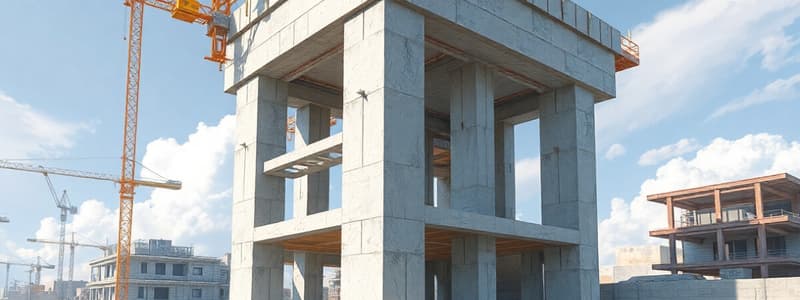Podcast
Questions and Answers
How much does an increase in concrete temperature by 20 degrees F affect finishing time?
How much does an increase in concrete temperature by 20 degrees F affect finishing time?
- Reduces finishing time by 20%
- Increases finishing time by 50%
- Reduces finishing time by 50% (correct)
- Has no impact on finishing time
Laminated fiber form use for columns should be braced if over?
Answer
Laminated fiber form use for columns should be braced if over? Answer
- At least 15 feet (correct)
- At least 20 feet
- At least 12 feet
- At least 10 feet
What is another name for high-range water-reducing admixtures?
What is another name for high-range water-reducing admixtures?
- Accelerators
- Retarders
- Hydraulic agents
- Superplasticizers (correct)
- What temp does cold-weather concreting need to be performed when the mean daily temperature is below or expected to fall below?
- What temp does cold-weather concreting need to be performed when the mean daily temperature is below or expected to fall below?
What is the minimum depth of the control joint for a slab that is five inches thick?
What is the minimum depth of the control joint for a slab that is five inches thick?
What is the anticipated effect of adding too much air to concrete?
What is the anticipated effect of adding too much air to concrete?
What is the purpose of using double headed or duplex nails in concrete formwork?
What is the purpose of using double headed or duplex nails in concrete formwork?
What should be added to concrete to improve its properties when working in cold weather?
What should be added to concrete to improve its properties when working in cold weather?
What effect does lightly dampening the subgrade have before placing concrete?
What effect does lightly dampening the subgrade have before placing concrete?
Which design procedure accounts for the downward deflection of formwork during concrete placement?
Which design procedure accounts for the downward deflection of formwork during concrete placement?
What is the recommended construction live load allowance per square foot for elevated slab formwork, as per the American Concrete Institute?
What is the recommended construction live load allowance per square foot for elevated slab formwork, as per the American Concrete Institute?
What admixture is commonly used to cool hot concrete containing excess water?
What admixture is commonly used to cool hot concrete containing excess water?
Which of the following is NOT a valid reason to use an admixture in concrete?
Which of the following is NOT a valid reason to use an admixture in concrete?
What type of forms provide good reuse of equipment, larger concrete placements, and decreased erection time?
What type of forms provide good reuse of equipment, larger concrete placements, and decreased erection time?
What is the best way to reduce lateral pressure on concrete forms when placing concrete?
What is the best way to reduce lateral pressure on concrete forms when placing concrete?
The most common spread footing consist of a rectangular or square slab of constant thickness. Reinforcing bars are placed near the bottom of the footing and run
The most common spread footing consist of a rectangular or square slab of constant thickness. Reinforcing bars are placed near the bottom of the footing and run
Flashcards
Concrete Temperature and Finishing Time
Concrete Temperature and Finishing Time
A 20 degree Fahrenheit increase in concrete temperature can significantly speed up the finishing process, halving the time required.
Bracing Laminated Fiber Forms
Bracing Laminated Fiber Forms
When using laminated fiber forms for columns, bracing is essential for columns exceeding 15 feet in height.
Superplasticizers in Concrete
Superplasticizers in Concrete
High-range water-reducing admixtures, crucial for enhancing concrete workability, are also known as superplasticizers.
Cold-Weather Concreting
Cold-Weather Concreting
Signup and view all the flashcards
Advantages of Gang Forms
Advantages of Gang Forms
Signup and view all the flashcards
Spread footing reinforcement
Spread footing reinforcement
Signup and view all the flashcards
Elevated slab formwork live load
Elevated slab formwork live load
Signup and view all the flashcards
Concrete control tests
Concrete control tests
Signup and view all the flashcards
Too much air in concrete
Too much air in concrete
Signup and view all the flashcards
Camber in formwork
Camber in formwork
Signup and view all the flashcards
Best nails for concrete forms
Best nails for concrete forms
Signup and view all the flashcards
Lateral pressure on forms
Lateral pressure on forms
Signup and view all the flashcards
Cold weather concrete admixture
Cold weather concrete admixture
Signup and view all the flashcards
Study Notes
Spread Footings
- Rectangular or square slabs are the most common spread footings.
- Reinforcing bars are placed near the bottom, running in both directions.
Elevated Slab Formwork Design Load
- Design load includes slab dead load and a 50 lb/ft² construction live load allowance (per ACI).
Concrete Control Tests
- Slump, air content, compressive strength, and yield tests should comply with appropriate ASTM specifications.
Concrete Air Content
- Excessive air weakens and reduces durability.
Formwork Deflection
- Camber accounts for anticipated downward deflection during concrete filling.
Formwork Fastening Nails
- Double-headed (duplex) nails are best for removable bracing and forms.
Lateral Pressure Reduction
- Slower concrete placement reduces lateral pressure on forms.
Cold Weather Concrete Additives
- Calcium chloride is added to concrete in cold weather.
Subgrade Dampening
- Lightly dampening the subgrade prevents rapid water extraction from the concrete.
Hot Weather Concrete Admixture
- Fly ash is used to cool concrete with high water content.
Concrete Finishing Admixture
- Retarders are best for finishing hot concret.
Admixture Usage
- Admixtures don't increase concrete permeability.
Concrete Temperature and Finishing Time
- A 20°F increase in concrete temperature reduces finishing time by 50%.
Laminated Fiber Column Forms
- Bracing is required for laminated fiber forms exceeding 15 feet.
High-Range Water-Reducing Admixtures
- High-range water-reducing admixtures are also called superplasticizers.
Cold Weather Concreting Temperature
- Cold-weather concreting should occur when the mean daily temperature is not below or expected to fall below 40°F.
Formwork Types
- Gang forms are beneficial for equipment reuse, large placements, and reduced erection time.
Control Joint Depth
- Control joints for a 5-inch thick slab should be 1.25 inches deep (min. 1 inch).
Studying That Suits You
Use AI to generate personalized quizzes and flashcards to suit your learning preferences.



